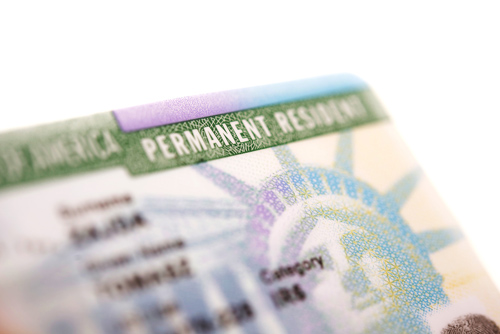
U.S. Green Card – Requirements, Application, Tax Implications

For decades, the United States Permanent Resident Card – better known as a "Green Card" – has been one of the most sought after resident permits in the world. A Green Card grants its holder the right to live permanently in the United States (wherever one chooses) and to be self-employed or work for any employer. And, in contrast to employment-based nonimmigrant visas, once you have an employment-based Green Card, you are no longer restricted to working for the company that sponsored your application for a Green Card.
In many cases, employees residing in the United States during a work assignment are very interested in applying for a Green Card. Employers who support such employee requests retain their best and most experienced employees while giving them an incentive to remain at their U.S. location indefinitely.
Green card holders may apply for U.S. citizenship
Green card holders can obtain U.S. citizenship after 3 to 5 years. However, if you want to retain your current citizenship, be sure to review any citizenship retention requirements prior to applying for U.S. citizenship.
Our experienced U.S. visa law attorneys can advise you on all aspects of how to apply for a Green Card. And our services range from an initial consultation to an evaluation of the tax implications of an application for U.S. citizenship. We offer our services personally in Germany or worldwide via phone/video call.
Requirements for applying for a Green Card
Green cards confer numerous rights but also come with certain responsibilities:
- Holders of a Green Card must move to, and permanently live in, the United States. Otherwise the Green Card may be lost.
- Travel outside the United States for less than 6 consecutive months is generally unproblematic. Stays abroad for more than six consecutive months but less than one year can cause problems for Green Card holders when they wish to reenter the United States. In such cases, it is not unusual that a U.S. Customs and Border Protection officer will ask questions and demand documents proving ongoing intent to live in the United States permanently.
- If a Green Card holder has stayed outside the United States for more than one year, she will generally have to apply for a special Returning Resident Visa. And said Returning Resident Visa will be issued only if certain requirements are met – including, most importantly, clear evidence of a continuous and unbroken intent to maintain U.S. residence.
Reentry permit for Green Card holders
If, in advance of your travel outside the United States, you already know that you will be staying abroad for an extended period, you should consider applying for a so-called reentry permit. This allows you to stay outside the United States for up to two years without having to obtain a returning resident visa. But even if you have a reentry permit, you should be prepared to explain and justify your extended stay abroad when returning to the United States.
Tax implications of a Green Card
Before obtaining a Green Card, one should also consider the tax implications, both under U.S. tax law and your home country's tax law. If you have a Green Card, you must generally file a U.S. tax return regardless of whether you are residing inside or outside the United States.
After receiving a Green Card, some consider the option of abandoning their Green Card by filing Form I-407. One reason to formally abandon Green Card status would be that one has moved from the U.S. to another country and no longer has any intent to return to the United States. However, abandoning a Green Card can have signification tax implications that should be reviewed prior to any abandonment.
Employment-based vs. family-based Green Cards

Two of the most popular Green Card categories are employment-based and family-based Green Cards. Applications for employment-based Green Cards are generally filed by a U.S. employer, who submits Form I-140, Immigrant Petition for Alien Worker.
Applications for family-based Green Cards are filed by either U.S. citizens or by U.S. Green Card holders, who submit Form I-130, Petition for Alien Relative.
There are, however, a few other important Green Card categories:
- Thanks to the so-called EB-5 Immigrant Investor Program, certain investors are also eligible to apply for a Green Card.
- Individuals with extraordinary abilities may be allowed to self-petition for a Green Card under category EB-1 even without an offer of employment.
- Individuals belonging to an occupational category that is in the United States' national interest may be eligible to apply for a category EB-2 Green Card without the support of an employer.
- For all other individuals, participating in the Green Card lottery may also be an option.
Employment-based Green Cards
The number of employment-based Green Cards is subject to a quota, which means that only a limited number of Green Cards of this categories are issued per fiscal year. If, in one category, more applications are received than there are Green Cards available, the excess number of applications will be put on a waiting list, i.e. the applications are not rejected but will be processed at a later time.
Generally, employment-based Green Cards require an employment offer. There are two exceptions. First, the categoryEB-1 (workers with extraordinary ability) does not require an employment offer but instead requires only an intent to continue to work in the area in which one has demonstrated extraordinary ability. Second, workers in the category EB-2 are exempt from the employment offer requirement if they can show that their proposed employment would be in the United States' national interest (the so-called “national interest waiver” or “NIW”).
The potential U.S. employer will also generally be required to show that he cannot fill the position with a U.S. citizen (labor certification). Only the categories EB-1 (all sub-categories), EB-2 (provided the applicant's proposed employment is in the United States' national interest), EB-4, and EB-5 are exempt from this requirement.
Employment-based Green Cards are divided into the following sub-categories:
- EB-1 for
- workers with extraordinary abilities (achievements must be recognized at national or international level)
- outstanding professors and researchers
- multinational executives and managers
- EB-2 for
- advanced degree professionals: Individuals with an occupation for which a U.S. bachelor's degree is a minimum requirement and who have a higher degree than a U.S. bachelor's degree (or a foreign equivalent degree, like a master's or doctoral degree) or a bachelor's degree plus no less than 5 years of work experience.
- persons with exceptional ability: Individuals who are able to show exceptional ability in their specialty (national recognition sufficient)
- EB-3 for
- professional workers: Individuals, whose occupation normally requires no less than a U.S. bachelor's degree, and individuals, who have earned such U.S. bachelor's or a foreign equivalent degree
- skilled workers: Individuals, whose occupation requires at least 2 years of training
- unskilled workers: Individuals, whose occupation requires no such training
- EB-4 for
- members of religious denominations or faith communities, who wish to carry on the vocation of a religious worker (pastor, priest, etc.)
- EB-5 for
- individuals who plan to invest one million U.S. dollars in an existing or a newly founded enterprise in the United States and thereby plan to create ten permanent full-time jobs. If the enterprise is located in an economically weak region, an investment of half a million U.S. dollars will be deemed sufficient.
Video: EB-5 Visa - U.S. Green Card for Immigrant Investors
Family-based Green Cards
Except for the IR category of immediate relatives, the number of family-based Green Cards available is also subject to a quota, which means that only a limited number of Green Cards are issued per fiscal year, which causes "excess applications" not to be processed immediately but to be placed on a sort of waiting list.
Family-based Green Cards are divided into the following categories:
- IR category (immediate relatives) for immediate relatives of U.S. citizens
- IR-1 for spouses
- IR-2 for unmarried children under the age of 21
- IR-3 for orphans adopted abroad
- IR-4 for orphans adopted in the United States
- IR-5 for parents of U.S. citizens who are at least 21 years old
- F category (family preference relatives) for certain other relatives of U.S. citizens or, in some cases, Green Card holders
- F1 for unmarried children of U.S. citizens who are 21 years old or older
- F2A for spouses and minor children of Green Card holders
- F2B for unmarried sons and daughters (21 years of age or older) of Green Card holders
- F3 for married sons and daughters of U.S. citizens
- F4 for brothers or sisters of U.S. citizens who are at least 21 years old
U.S. Green Card services worldwide provided by our experienced attorneys
Have you decided to apply for a Green Card? If you would like our experienced attorneys to assist you with your Green Card application, we would be pleased to provide comprehensive advice on all aspects of Green Card applications and assist you through all steps in the process.
In addition to advising you on visa law and checking whether or not you may keep your current citizenship, our attorneys can help you evaluate the tax implications of your U.S. naturalization.
Please do not hesitate to contact us at any time if you wish to make an appointment for a consultation meeting with one of our experts by e-mail (info@visum-usa.com) or, of course, by phone (+49 69 76 75 77 85 26). We offer our services wordwide.
Contact
Fields marked with * are mandatory.








